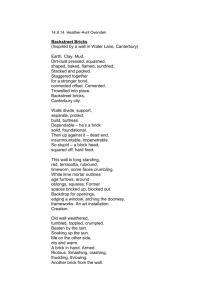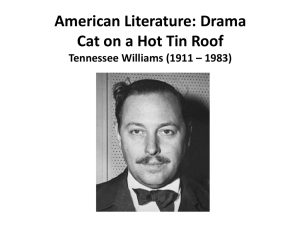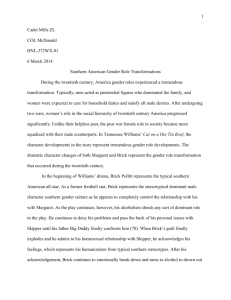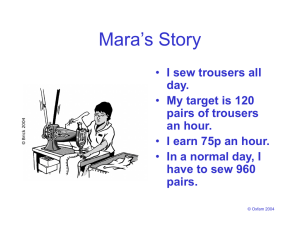4U_Cat_Teacher_Come_back_to_the_locker_room
advertisement
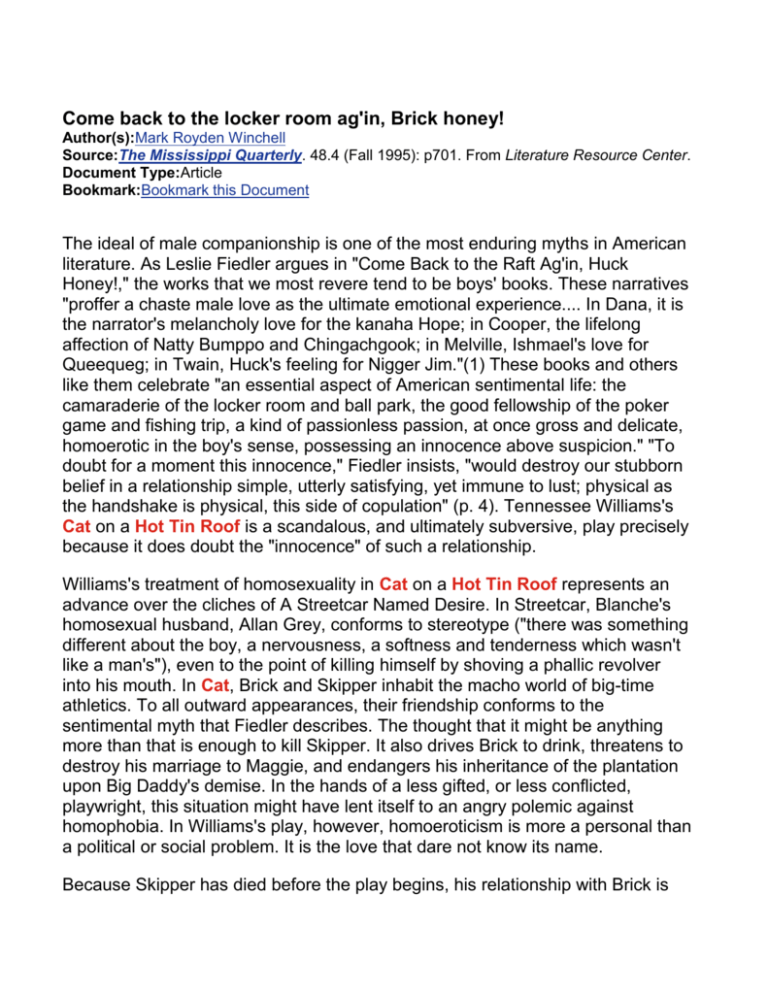
Come back to the locker room ag'in, Brick honey! Author(s):Mark Royden Winchell Source:The Mississippi Quarterly. 48.4 (Fall 1995): p701. From Literature Resource Center. Document Type:Article Bookmark:Bookmark this Document The ideal of male companionship is one of the most enduring myths in American literature. As Leslie Fiedler argues in "Come Back to the Raft Ag'in, Huck Honey!," the works that we most revere tend to be boys' books. These narratives "proffer a chaste male love as the ultimate emotional experience.... In Dana, it is the narrator's melancholy love for the kanaha Hope; in Cooper, the lifelong affection of Natty Bumppo and Chingachgook; in Melville, Ishmael's love for Queequeg; in Twain, Huck's feeling for Nigger Jim."(1) These books and others like them celebrate "an essential aspect of American sentimental life: the camaraderie of the locker room and ball park, the good fellowship of the poker game and fishing trip, a kind of passionless passion, at once gross and delicate, homoerotic in the boy's sense, possessing an innocence above suspicion." "To doubt for a moment this innocence," Fiedler insists, "would destroy our stubborn belief in a relationship simple, utterly satisfying, yet immune to lust; physical as the handshake is physical, this side of copulation" (p. 4). Tennessee Williams's Cat on a Hot Tin Roof is a scandalous, and ultimately subversive, play precisely because it does doubt the "innocence" of such a relationship. Williams's treatment of homosexuality in Cat on a Hot Tin Roof represents an advance over the cliches of A Streetcar Named Desire. In Streetcar, Blanche's homosexual husband, Allan Grey, conforms to stereotype ("there was something different about the boy, a nervousness, a softness and tenderness which wasn't like a man's"), even to the point of killing himself by shoving a phallic revolver into his mouth. In Cat, Brick and Skipper inhabit the macho world of big-time athletics. To all outward appearances, their friendship conforms to the sentimental myth that Fiedler describes. The thought that it might be anything more than that is enough to kill Skipper. It also drives Brick to drink, threatens to destroy his marriage to Maggie, and endangers his inheritance of the plantation upon Big Daddy's demise. In the hands of a less gifted, or less conflicted, playwright, this situation might have lent itself to an angry polemic against homophobia. In Williams's play, however, homoeroticism is more a personal than a political or social problem. It is the love that dare not know its name. Because Skipper has died before the play begins, his relationship with Brick is never dramatized. Instead, Williams gives us at least five different interpretations of that relationship. These different interpretations serve a theatrical function somewhat similar to multiple points of view in a novel. Just as we get a more rounded picture of Thomas Sutpen by seeing him from a variety of perspectives, we understand more about Brick and Skipper by seeing the impact of their friendship on an entire cast of characters. What remains uncertain is the view of Williams himself. In the alternate third acts that he wrote for the play and the various contradictory comments he made about his intentions, Williams reflected an ambivalence that finally makes Cat a problematic, if undeniably powerful, work of art. The most conventional interpretation of Brick's relationship with Skipper is rendered by Mae and Gooper. They see these two gridiron heroes as examples of arrested development. In the original version of the third act, Mae says: "Brick kept living in his past glory at college! Still a football player at twenty-seven!"(2) In the Broadway version of the play, these observations are split between Mae and Gooper. In both versions, the brother and sister-in-law try to convince Big Daddy and Big Mama that Brick is a sexual deviate. It would be inexact, however, to characterize Mae and Gooper as homophobic. They undoubtedly support the offical taboos against homosexuality, but there is no evidence that they are viscerally offended by the thought that Brick is a "pervert." The only emotions that seem to move them are avarice and envy. If anything, they are probably delighted by the thought that Brick is the antithesis of the all-American male everyone has believed him to be. That notion would vindicate the less gifted and less favored Gooper, while giving him his most plausible claim to Big Daddy's inheritance. In his characterization of Mae and Gooper, Williams seems downright heterophobic. By making the only monogamous heterosexuals in the play his two most ridiculous and loathsome characters, he invites us to deplore the traditional family. Big Daddy compares Mae's fertility to that of a farm animal, and Maggie refers to her nieces and nephews as "no-neck monsters." A more evenhanded playwright might have generated some small degree of sympathy for the slighted older brother, but Williams is unrelentingly contemptuous in his portrayal of the entire Gooper clan.(3) If this is what the nuclear family looks like, then perhaps the embittered celibacy of Brick or the primal lecheries of Big Daddy represent more authentic responses to life. The male bonding of two football teammates or even the same-sex marriage of Jack Straw and Peter Ochello may be even better. To see Brick and Skipper only as cases of arrested development, with no sexual overtones, is still to evoke the ideal of male companionship that Fiedler argues is at the heart of our classic literature. The heroes of our boys' books (Huck and Jim, Natty and Chingachgook, Ishmael and Queequeg) are themselves boys who never grew up. Whatever else they may have been Brick and Skipper were certainly of this company. When Richard Brooks adapted Cat for the screen in 1958, he was forced to purge any allusions to homosexuality. The theme of prolonged adolescence was stressed, instead. Brick could not be a husband to Maggie or an heir to Big Daddy because those roles would have forced him to assume adult responsibility. (Skipper fell apart because his athletic inadequacies were graphically exposed when he was forced to play a televised game without the injured Brick at his side.) By enabling Brick finally to assume those responsibilities, Brooks's film manufactures an upbeat ending that violates the spirit of Williams's play. Nevertheless, by making the issue of maturation the crux of his film, Brooks remains in the tradition of the classic American myth and reminds us how much of that myth can survive even the bowdlerizing efforts of the censors.(4) Brick's own view of his friendship with Skipper is both complex and defensive. If Mae and Gooper are only casually homophobic, Brick is profoundly disturbed by the thought of unconventional sexuality. In Act Two, he tells Big Daddy that "at Ole Miss when it was discovered a pledge to our fraternity, Skipper's and mine, did a, attempted to do a, unnatural thing with--We not only dropped him like a hot rock!--We told him to get off the campus, and he did, he got!" (p. 119). At no point in the play does Brick ever entertain the notion that he and Skipper are anything more than good locker-room buddies. He protests (perhaps too much) that, unlike Straw and Ochello, he and Skipper are not "ducking sissies . . . queers" (p. 118). He asks Big Daddy: "Why can't exceptional friendship, real, real, deep, deep friendship! between two men be respected as something clean and decent" (p. 120). Then, he goes on to give his version of that friendship: Skipper and me had a clean true thing between us!-had a clean friendship, practically all our lives, till Maggie got the idea you're talking about. Normal? No!-It was too rare to be normal, any true thing between two people is too rare to be normal. Oh, once in a while he put his hand on my shoulder or I'd put mine on his, oh, maybe even when we were touring the country in pro-football en' shared hotel-rooms we'd reach across the space between the two beds and shake hands to say goodnight. (pp. 120-121) What Brick has described is "a relationship simple, utterly satisfying, yet immune to lust; physical as the handshake is physical." Brick is quite right in saying that Maggie destroyed this idyllic relationship by suggesting that it was not entirely innocent. To speak of "innocence" in this context is not to imply that fully realized homosexual lust is "guilty" (although Brick obviously thinks that it is). Innocence simply means a lack of knowledge. A closeness that might seem suspect in grown men is accepted between boys. As long as Brick and Skipper are able to foster the illusion that they are still boys (with a barnstorming football team that is nearly as much of a fantasy as Tom Sawyer's Gang), they are safe in their homoerotic Eden. The fall from innocence occurs with the knowledge that Maggie forces Skipper to consider. She may see herself as a cat on a hot tin roof, but in this particular situation she more closely resembles the snake in the Garden. Brick blames himself for Skipper's death because he failed to help his friend face the truth when Skipper called him to make a tearful and drunken confession. If Skipper is undone by too much knowledge, Brick suffers from a desperately willed innocence. Like the doomed naifs in Hawthorne's fiction, he will not face his fallen condition. Instead, he waits for the alcoholic click that will allow him to evade responsibility. For most of the play (and perhaps even at the end), he is unwilling to accept Maggie's belief that "life has got to be allowed to continue even after the dream of life is--all--over" (p. 57). As Arthur Ganz argues, Brick bears a remarkable resemblance to the more obviously delusional Blanche DuBois. Like Blanche, Brick drives a homosexual to self-destruction by withholding love and understanding. (In response, both Blanche and Brick seem intent on righting the balance by destroying themselves.) The audience reaction to their situations would have been different, however, especially in an age when homosexuality was thought to be a curable affliction. "The audience, although it sympathizes with Blanche, can accept her as guilty," Ganz writes. "She is a woman, and had she been able to give her husband love instead of contempt, she might have led him back to a normal life. Brick, however, confronted with Skipper's telephoned confession of a homosexual attachment, is hardly in a position to do the same--short of admitting a similar inclination."(5) Whether Brick has experienced such an inclination is not entirely clear. In an interview with Arthur B. Waters, which occurred while Cat was still playing on Broadway in 1955, Williams asserts: "Brick is definitely not a homosexual . . . Brick's self-pity and recourse to the bottle are not the result of a guilty conscience in that regard.... It is his bitterness at Skipper's tragedy that has caused Brick to turn against his wife and find solace in drink, rather than any personal involvement, although I do suggest that, at least at some time in his life, there have been unrealized abnormal tendencies."(6) Many playgoers, particularly in 1955, would have thought it strange for such tendencies to manifest themselves in the insistently masculine world of college and professional sports. (In ballet or interior decoration, yes, but not in football!) However, Williams may be doing something here beyond a mere playful shattering of stereotypes. Whether we admit it or not, the all-male world has always had the potential for more than chaste camaraderie. As Fiedler notes, "the buggery of sailors is taken for granted everywhere, yet is usually thought of as an inversion forced on men by their isolation from women; though the opposite case may well be true: the isolation sought more or less consciously as an occasion for male encounters" (p. 10). Another perspective on this issue was suggested by David Gelman in an article in Newsweek when President Clinton was trying to ease the ban on homosexuals in the military. "There is . . . an undercurrent of homoerotic tension in the shared latrines, shower rooms and sleeping quarters of barracks life," Gelman writes. "G.I.s get used to the loss of privacy soon enough, but not, perhaps to the enforced physical intimacy. 'If I'm in the shower,'says Mike Tuttle, a specialist at Ft. Bragg, N.C., 'I'd like to know I'm not being ogled over by some guy.' It's an unaccustomed worry for men. By imagining themselves objects of homosexual lust, they unwittingly place themselves in the feminine role-which may explain the vehemence of their objections."(7) Even if Brick possesses no "abnormal tendencies" himself, the thought that he is the object of male lust raises questions of gender identity that may help to account for the vehemence of his objections. Because Skipper is dead before the play opens, we know of his views only through hearsay. Apparently, the face he showed to the world was as homophobic as Brick's. He was involved in the fag bashing that went on in the fraternity at Ole Miss and responded with panicked denials when Maggie dared to mention the feelings he harbored for Brick. In a moment of drunken candor, she said: "SKIPPER! STOP LOVING MY HUSBAND OR TELL HIM HE'S GOT TO LET YOU ADMIT IT TO HIM!" (p. 59). Skipper slapped her hard on the mouth and ran away. Later that night, he came to her hotel room and tried to prove his masculinity in bed. When that attempt failed, Skipper was convinced that he must be homosexual. It was then that he made his hapless confession to Brick and quickly degenerated into a frenzy of self-loathing. When Maggie recalls her sexual encounter with Skipper, she tells Brick, "We made love to each other to dream it was you, both of us!" Paradoxically, Maggie's body is the one place where Brick and Skipper can experience a blameless physical communion. It has an appeal akin to what Fiedler characterizes as the appeal of the whorehouse--"a kind of homosexuality once removed."(8) The notion that Skipper's liaison with Maggie may actually be a repressed manifestation of his lust for Brick would seem to be supported by recent studies in gender theory. The feminist critics Gayle Rubin and Eve Kosofsky Sedgwick argue that in a patriarchal society such as ours the primary social bonds are the ones between men. Because these bonds "entail degrees of libidinal investment" that may be mistaken for homoeroticism, men "are chronically under pressure to guarantee their own heterosexual status, to ward off the threatening possibility that their relationships are not, after all, so very different from direct homosexual bonds." (The prolonged athletic camaraderie of Brick and Skipper would certainly fall into this category.) Such guarantees often take the form of "casting male same-sex bonds as relations of rivalry or competition for a female object of desire rather than as directly desirous relations between men."(9) Skipper's misfortune is that for him this guarantee fails to work. One of the ironies of Williams's play is that its two most overtly heterosexual characters -- Maggie and Big Daddy -- are also the most tolerant of the latent erotic ties between Brick and Skipper. Brick takes the position that anything other than chaste male friendship would be literally unspeakable, while his wife and father try to show an understanding that he hysterically rejects. In Act One, Maggie describes the affection she has detected between Brick and Skipper: It was one of those beautiful, ideal things they tell about in the Greek legends. It couldn't be anything else, you being you, and that's what made it so sad, that's what made it so awful, because it was love that could never be carried through to anything satisfying or even talked about plainly. Brick, I tell you, you got to believe me, Brick, I do understand all about it! I-I think it was noble! ... Why I remember when we double-dated at college, Gladys Fitzgerald and I and you and Skipper, it was more like a date between you and Skipper. Gladys and I were just sort of tagging along as if it was necessary to chaperone you!--to make a good public impression--(p. 57) If the theme of homosexuality is closer to the center of the plot in Cat on a Hot Tin Roof than it is in A Streetcar Named Desire, the physical fact of such relations is more distant. Not only is there a lack of sexual intimacy between Brick and Skipper, but the very language with which Maggie describes the situation elevates it to a platonic status. The analogy she makes is not even to something as near as the bonding of males in the mythic American wilderness but to "those beautiful, ideal things they tell about in the Greek legends." When Brick accuses her of naming his friendship with Skipper dirty, Maggie responds: "I'm naming it so damn clean that it killed poor Skipper! -- you two had something that had to be kept on ice, yes, incorruptible, yes! -- and death was the only icebox where you could keep it" (p. 58). The irony here is that literal homosexuality was very much a part of life in ancient Greece. (Myles Raymond Hurd argues that Williams, who had been familiar with classic Greek literature from the age of twelve, based the friendship of Brick and Skipper on the relationship between Achilles and his "masculine whore" Patroclus.(10)) It is clear, however, that Maggie is not being snide or disingenuous in holding up the Greeks as examples of chaste male love. Any intentional irony is on the part of the playwright himself. If Arthur Ganz is correct in comparing Brick to Blanche DuBois, Maggie makes an even more instructive contrast to Blanche. Whereas Blanche expressed disgust at discovering her husband's homosexuality, Maggie offers understanding. Of course, the circumstances of the two situations are crucially different. Blanche stumbles across her husband in the act; Maggie only discerns evidence of unconsummated desire in her husband's best friend. Still, Williams could have turned Maggie into a castrating bitch rather than a seductive cat had he chosen to do so. In "Three Players of a Summer Game," the short story from which Cat is derived, the original character of Brick Pollitt is driven to drink and a brief summer affair by his emasculating wife, Margaret. "At the end of the story," Roger Boxill writes, "Williams emphasizes the castration theme by comparing Margaret to an ancient conqueror as she drives about town with her amiably senseless husband like a captive in chains behind her."(11) It would seem that in writing Cat, Williams deliberately made the character of Margaret more sympathetic than he had in the earlier story. (For one thing, in the story, Margaret withholds sex from her husband, while Maggie the Cat is intent on getting him into bed.) As he writes in the "Note of Explanation" that accompanies the printed text of his play, "Maggie the Cat had become steadily more charming to me as I worked on her characterization" (p. 168). Had Williams not found Maggie steadily more charming, he could easily have made her into a female Stanley Kowalski. Brick's assumption that she has driven Skipper to his death (much as Stanley helped drive Blanche insane) seems implausible only because Williams convinces us of Maggie's basic sincerity and decency. Had he wanted to, he could have made her lie about her pregnancy seem as avaricious as any plot hatched by Mae and Gooper. Instead, he presents it as an affirmation of life in the face of death. In separating Brick from his liquor until he satisfies her desire, Maggie commits an act that Williams might have presented as marital rape. Instead, he encourages us to think that she is acting in Brick's best interests as well as her own. (This is particularly true in the Broadway version of the third act.) Peter L. Hays even goes so far as to say that "Maggie ... gives Brick his life back, and from him, Williams implies, she will conceive more."(12) The tolerance that Big Daddy extends to Brick is even greater than Maggie's forbearance. It is also more threatening, because the thing that Big Daddy seems to be tolerating is what Brick has tried most aggressively to deny. When Brick protests that people have been suggesting that he and Skipper were "queer," Big Daddy's response is to stress his own worldliness. He talks about having "bummed this country.... Slept in hobo jungles and railroad Y's" (p. 115). The implication is that he has seen homosexual behavior and is not particularly shocked by it. (Unlike his son, he has not had the luxury of belonging to a fagbashing fraternity at Ole Miss.) Even closer to home, he has inherited his plantation (twenty-eight thousand acres of the richest land this side of the Valley Nile) from the homosexual couple Jack Straw and Peter Ochello. They took him in when he was young and poor and made him overseer of the place that he now owns. It would hardly be stretching a point to say that they became his surrogate parents. When Brick contemptuously refers to them as "a pair of old sisters" (p. 115), Big Daddy angrily responds: "Now just don't go throwin' rocks at -- " (p. 116). Whatever else one might say about Straw and Ochello, their stewardship of the land has been far more impressive than that of the degenerate heterosexuals who mortgaged Belle Reve to pay for their epic fornications. Several times in the discursive stage directions he wrote for the published version of Cat, Williams emphasizes the fact that Brick and Maggie are staying in the room that had been shared by Straw and Ochello. At the most literal level, their coupling after the final curtain falls would be a triumph for heterosexual "normalcy." However, the symbolic implications of their act are not so clearly cut. As previously noted, Maggie's body is the one point of sexual contact that Brick and Skipper have shared. By sleeping with Maggie, Brick may be vicariously establishing a sexual bond with his dead friend. Moreover, the practical consequence of resuming marital relations would be to enhance Brick's chances of inheriting the plantation that originally belonged to two overt homosexuals. Commenting on this symbolism, David Savran writes: "[Brick's] successful impregnation of his wife in the bed of Jack Straw and Peter Ochello would ironically attest less to the sudden timely triumph of a `natural' heterosexuality than to the perpetuation of a homosexual economy and to the success of Maggie's fetishistic appropriation of Skipper's sexuality. (It is in this sense that Brick's act of making the lie of Maggie's pregnancy true would also make true the `lie' about Brick and Skipper.)"(13) Although Cat on a Hot Tin Roof challenges the social taboos against homaeroticism, Williams's most vital and most memorable character is a heterosexual hedonist. Big Daddy elevates physical pleasure above all other values. He tells Brick that if he doesn't like Maggie, he should find another woman, even as he himself expresses physical disgust with Big Mama and dreams of a mistress he can "hump from Hell till breakfast." If Brick's homophobia is largely defensive, Big Daddy's tolerance marks him as a man beyond suspicion. (As he reveals in his conversation with Brick, he draws the line only at child prostitution.) Refreshing as his honesty may be in a world of mendacity, Big Daddy nevertheless falls short of being a moral norm. In his treatment of Big Mama, he commits what Blanche DuBois considered the one unforgivable sin -- deliberate cruelty. The contrast between Big Daddy's gusto and Brick's lethargy is so great that we are apt to miss the similarities of father and son. Both men have left the marital bed because of a self-Indulgent revulsion with their wives. For both men, it is love itself that dare not speak its name. What distinguishes Jack Straw and Peter Ochello from Brick and Big Daddy is not their sexual orientation but their superior fidelity to each other. The fact that their relationship is never depicted but only described makes it seem all the more ideal. (When Brick protests that his friendship with Skipper was nothing like that of Straw and Ochello, he speaks with greater truth than he realizes.) Even though the "marriage" of these two men might seem to resemble the male bonding that Fiedler describes, it differs from that paradigm in two significant respects. First, and most obviously, Straw and Ochello were not a chaste pair living in a realm of mythic innocence. (Brick's crudely homophobic language leaves no doubt about the nature of their relationship.) Perhaps just as important, Straw and Ochello did not run away from home, or try to escape petticoat government, but lived totally within the confines of civilization. The wilderness buddies Fiedler identifies in our classic literature can find freedom and fulfillment only in the tabula rasa of nature. We can imagine Huck and Jim on a raft, not on twenty-eight thousand acres of the richest land this side of the Valley Nile. In Straw and Ochello, Williams subverts the American myth of male companionship, not just by making its homoeroticism explicit but by domesticating it. In contrast, the world of the Dixie Stars seems far closer to the never-never land of perpetual childhood. Even though audiences have been moved by Cat on a Hot Tin Roof in the forty years since its premiere on Broadway, critics and ordinary theatre-goers alike have not always known what to make of the play. If Williams's treatment of homoeroticism seemed scandalous in 1955, more recent theorists have chided Williams for his reticence and evasiveness. (14) Most observers have been troubled by the playwright's difficulty in achieving a convincing sense of closure at the end of the play. Both the original and the Broadway versions of the third act leave questions unanswered and an uneasy sense that the answers suggested are willed and artificial. We are not certain, for example, whether Brick returns to Maggie's bed for any reason other than a desire to repossess his liquor. If he is just thirsty for a drink, then his alcoholism suddenly becomes the central issue of the play rather than the sign of a more deep-seated malaise. The renewed admiration for Maggie that Brick expresses in the Broadway version of the play seems insufficiently motivated. Williams has asserted elsewhere that Brick "will go back to Maggie for sheer animal comfort."(15) If that is so, he is no better than the satyriac Big Daddy and considerably less honest. Such an interpretation also leaves us wondering why Williams bothered to place such emphasis on Skipper's sad fate and on the seemingly noble legacy of Jack Straw and Peter Ochello. If the ending of the play (in either version) is willed, what exactly has theplaywright willed? He may simply have lost his nerve and returned Brick to the heterosexual fold to placate those in his audience who would have been shocked by any other ending. At the same time, he may be using a symbolic code to tell others in the audience that Brick is vicariously making love to Skipper when he "humps" Maggie in Straw and Ochello's bed. It is also possible that Williams grew to admire Maggie so much that he wanted to reunite her with Brick without finding a convincing way to do so. Perhaps he is saying that true love finally has nothing to do with sexual orientation. We can see it in Big Mama's affection for Big Daddy, in Skipper's attachment to Brick, and in the mutual fidelity of Straw and Ochello. Although it can come in many forms, such love is always a rare and elusive experience. Fiedler concludes his essay by quoting Jim's statement to Huck: "It's too good to be true, Honey.... It's too good to be true" (p. 12). Williams ends the original version of his play on a remarkably similar note -- with Maggie declaring her undying love for her husband, while Brick responds, "with charming sadness": "Wouldn't it be funny if that was true?" (p. 166).(16) (1) Leslie Fiedler, "Come Back to The Raft Ag'in, Huck Honey!," in The Fiedler Reader (Briarcliff Manor, New York: Stein & Day, 1977), pp. 5-6. (2) Tennessee Williams, Cat on a Hot Tin Roof, in The Theatre of Tennessee Williams (New York: New Directions, 1971), III, 150. (3) Charles Brooks describes Gooper's children as follows: "Everyone is supposed to adjust his life to these monstrous children: no matter how they slobber and drool over the tablecloth and the guests' clothing, the children must eat at the family table; everyone must applaud their gawkish, unwanted, and extended singing performance; the sister-in-law must calmly accept their precocious and vulgar insults; all belongings must be toys for the children, and no one should have possessions which might be dangerous for those grasping young ones." See Charles Brooks, "The Comic Tennessee Williams," Quarterly Journal of Speech, 44 (October 1958), 278. (4) For discussions of Brooks's film, see Gene D. Phillips, The Films of Tennessee Williams (Philadelphia: Art Alliance Press, 1980), pp. 133-154; Maurice Yacowar, Tennessee Williams and Film (New York: Ungar, 1977), pp. 38-48; and William Sacksteder, "The Three Cats: A Study in Dramatic Structure," Drama Survey, 5 (Winter 1966-67), 252-266. (5) Arthur Ganz, "The Desperate Morality of Tennessee Williams, American Scholar, 31 (Spring 1952), 286. (6) Arthur B. Waters, "Tennessee Williams: Ten Years Later," Theater Arts, July 1958, p. 73. (7) David Gelman, "Homoeroticism in the Ranks," Newsweek, July 26, 1993, p. 28. (8) Leslie Fiedler, Love and Death in the American Novel, Revised Edition (New York: Stein & Day, 1966), p. 318. (9) Christopher Looby, "`Innocent Homosexuality': The Fiedler Thesis in Retrospect," in Adventures of Huckleberry finn: A Case Study in Critical Controversy, ed. Gerald Graff and James Phelan (Boston: Bedford Books, 1995), p. 547 (10) See Myles Raymond Hurd, "Cats and Catamites: Achilles, Patroclus, and Williams's Cat on a Hot Tin Roof," Notes on Mississippi Writers, 23 (June 1991), 63-66. (11) Roger Boxill, Tennessee Williams (New York: St. Martin's Press, 1987), p. 116. (12) Peter L. Hays, The Limping Hero: Grotesques in literature (New York: New York University Press, 1971), p. 41. For a more detailed comparison of Cat with "Players of a Summer Game," see Charles E. May. "Brick Pollitt as Homo Ludens: `Three Players of a Summer Game' and Cat on a Hot Tin Roof," in Tennessee Williams: A Tribute, ed. Jac Tharpe (Jackson: University Press of Mississippi, 1977), pp. 277-291. (13) David Savran, "`By coming suddenly into a room that I thought was empty': Mapping the Closet with Tennessee Williams," Studies in the Literary Imagination, 24 (Fall 1991), 72. (14) See, for example, John M. Clum, "`Something Cloudy, Something Clear': Homophobic Discourse in Tennessee Williams," South Atlantic Quarterly, 88 (Winter 1989), 161-179. (15) Tennessee Williams, "Critic says `Evasion: Writer says `Mystery,'" in his Where I Live: Selected Essays, ed. Christine R. Day and Bob Woods (New York: New Directions, 1978), p. 73. (16) Charles E. May interprets this line much less optimistically, comparing it to Jake Barnes's reply to Lady Brett at the end of Hemingway's The Sun Also Rises: "Isn't it pretty to think so?" See May, p. 291. Abstract: Tennessee Williams's 'Cat on a Hot Tin Roof' is a subversive play because it expresses doubt at the innocence of male companionship. The homoerotic friendship between Brick and Skipper kills Skipper and makes Brick a drunkard. The two most overtly heterosexual characters, Big Daddy and Maggie, are the most tolerant of this homoerotic relationship. Even though the play was first performed in the 1950s, homosexuality is seen as a personal rather than a social or political problem. Source Citation Winchell, Mark Royden. "Come back to the locker room ag'in, Brick honey!" The Mississippi Quarterly 48.4 (1995): 701+. Literature Resource Center. Web. 29 Aug. 2011. Document URL http://go.galegroup.com.ezproxy.library.yorku.ca/ps/i.do?&id=GALE%7CA18115416&v=2.1&u =yorku_main&it=r&p=LitRC&sw=w

